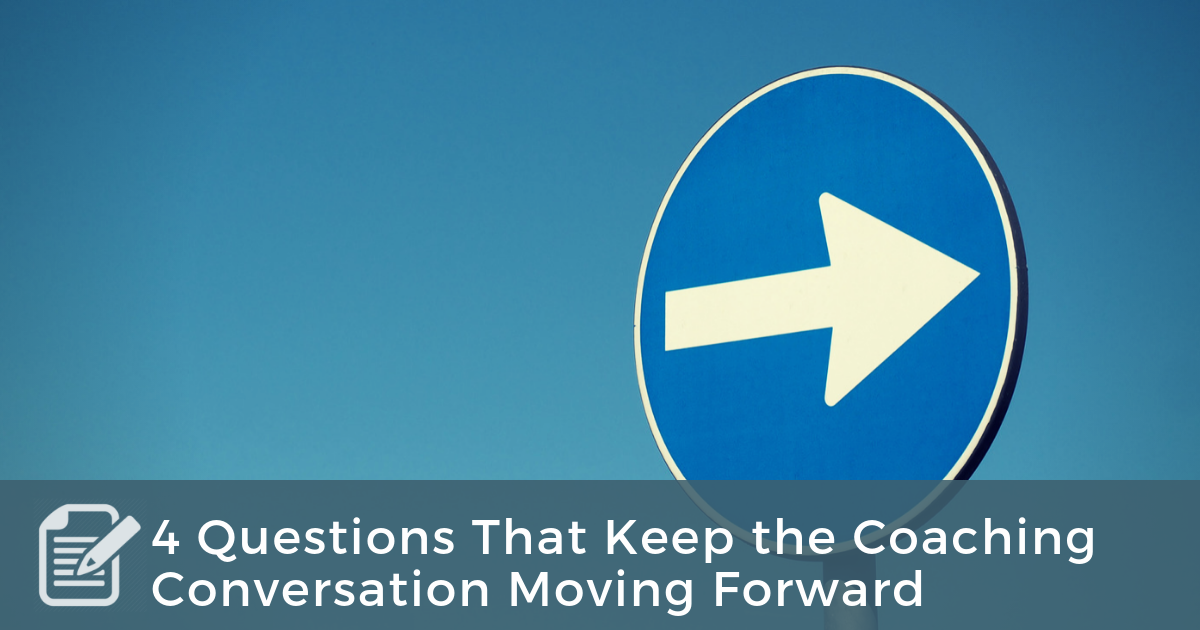 A coaching conversation is like taking your client for a ride on a roller coaster. They are climbs, plunges, curves, and sometimes you even go upside down. But one feature of a roller coaster that is always the same is that you get off the same place you get on. The coaching conversation must come back around. If you don’t intentionally bring the conversation back around, you find yourself off the rails. The ride never concludes. Fun is replaced with stress.
A coaching conversation is like taking your client for a ride on a roller coaster. They are climbs, plunges, curves, and sometimes you even go upside down. But one feature of a roller coaster that is always the same is that you get off the same place you get on. The coaching conversation must come back around. If you don’t intentionally bring the conversation back around, you find yourself off the rails. The ride never concludes. Fun is replaced with stress.
There are four questions I ask almost every time I coach. They are simple questions that are effective in moving the conversation through four distinct phases of the conversation. They provide an easy way to transition from one phase to another and allow you to concentrate on the process rather than the problem. The client gets a good ride and is able to disembark near the same place they started.
What do you want to talk about today? (Discovery around the Topic)
I can’t imagine a coaching conversation that doesn’t start with this question. I’m often asked if I revisit the last coaching conversation. My answer is “rarely.” While the client is struggling with the topic during the session, the struggle is often long forgotten by the next session. The coaching worked, and the client moved forward. We don’t want to start the client thinking about the past. We want the client to look forward.
The topic the client names will be general. We will not know the exact nature of the conversation at this point. Neither will the client. The client has experienced a struggle, and not only does the client not yet know the solution, she does not even know the full nature of the problem. We don’t want to narrow the conversation at this point. We want to widen it.
The client should immediately get some new thinking about this topic. What makes this topic important? What does it look like from someone else’s viewpoint? What could this look like in the future? As a coach, we are listening for patterns, key words, or even what is absent. This is a great time to be curious as a coach.
If we are successful today, what will you be walking away with? (Discovery around the potential Take Away)
This is not the same as asking, “What are you going to do about it?” That is the third question. This question asks how the action will be packaged. For instance, the client’s action might be packaged as a strategy, a solution, a research plan, an invitation to a select group, or building confidence. We tend to wrongly assume the client wants a solution, so at this point, we acknowledge that we don’t really know what the client wants from the conversation, and so we ask. I’m always surprised by their answer.
When do you ask this question? One indication is that if we don’t move on, we’ll run out of time. It is hard to put an exact time on this transition because there is some art to it rather than just formula, but you want to leave enough time for action to be planned AND accountability to be built.
A second indication that this is a good time to ask this question is that the coach realizes he has no idea where the client should go with this topic and begins to formulate solutions. If I’m not disciplined enough, I’ll find myself suggesting a solution through my questions. When I feel the responsibility of directing the client forward, it is time to ask, “What do you want to walk away with from this conversation?”
During this part of the coaching, I try to ask wide questions around what might fit into the package they described. Because they are wide questions, they might sound like discovery questions, but they have a different feel because rather than exploring the topic, we are now exploring what might fit into their desired take away.
Based on this conversation, what are you going to do? (Building an Action Plan)
At this point, we head back toward the beginning of the conversation. We leave wide questions behind and start taking stock of our discoveries. We want to build some structure around planned actions. We ask, “When are you going to do this? Who else needs to be involved? What more do you need to know? What obstacles might present themselves? What will be the first step?”
This phase can go rather quickly when the client has already had good discovery time in the above two questions. Their mind is stimulated. The possibilities have been expanded. The road ahead is clearer. This could be a good place to make their action steps SMART (specific, measurable, achievable, realistic, and time bound). The conversation needs to become more concrete.
How can we insure you will take this action? (Building Accountability)
For some clients, this question isn’t crucial. For others (including myself), it is indispensable. I have all kinds of plans. I can’t do them all. I must prioritize. I have to create some urgency for this action to stand out from all the other entries on my to do list.
I don’t like to use the word accountability because most people think accountability is a “who” rather than a “what.” The client needs to discover what creates good accountability for them. Many of my clients say writing it on their calendar is all they need. I need more. I might need something visual to remind me. Some people like to put forth a reward or penalty. Depending on your client, you may need to spend more time here than you might expect. I usually tell my coach that I want to spend at least a fourth of our time exploring how to insure the action. This question may be the one where you earn your value.
Conclusion
These four questions help move clients through a full coaching conversation and create the obvious transitions they need to think about the topic from discovery to action to accountability. You can use these questions to track and turn your clients so at the end of your time, they get back off the conversation near the place where it begun.



1 thought on “Four Questions that Keep the Coaching Conversation Moving Forward”
Hi Brian Miller!
What a great and encouraging piece around these four coaching questions. Whether as a beginner coach or a seasoned coach, I think revisiting these four questions from time-to-time can be a refreshing reminder for us about what the heart of coaching really is all about. Just reading through them felt like I was learning them for the first time again. I even saved the link to this blog on my home screen on my smart phone. It’s nice to have a framework to work off of as we continue coaching and developing our own style and approach to coaching. I so appreciate your ministry, your heart, and coaching expertise Brian. Thank You!
Thanks CAM!